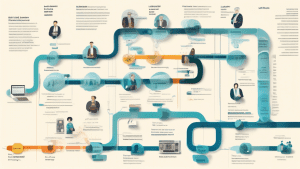Understanding the LLM Behind GitHub Copilot
GitHub Copilot has garnered significant attention in the programming and developer communities since its introduction. It serves as an AI-powered code completion tool, seamlessly assisting developers by suggesting lines of code or entire functions in real-time. At its core, GitHub Copilot is powered by advanced machine learning techniques, particularly a Large Language Model (LLM). This article delves into the LLM behind GitHub Copilot, addressing its functionalities, how it was trained, and the implications it holds for modern software development.
The Foundation: OpenAI Codex
The bedrock of GitHub Copilot is OpenAI Codex, a descendant of OpenAI‘s celebrated Generative Pretrained Transformer 3 (GPT-3) model. Codex is designed explicitly for understanding and generating code, distinguishing itself from other general-purpose language models by being fine-tuned for programming languages.
Codex is adept in a wide array of programming languages, including but not limited to Python, JavaScript, TypeScript, Ruby, and Go. This versatility allows it to assist developers across various domains and coding environments.
Training Data and Methodology
The effectiveness of Codex comes from its extensive training on a diverse dataset sourced from publicly available code repositories, documentation, and forums. The training process involves:
- Data Collection: Gathering vast amounts of publicly available code, ensuring a wide breadth of examples for the model to learn from.
- Preprocessing: Cleaning and structuring the collected data to make it suitable for the model. This step includes removing personal or sensitive information and ensuring code snippets are contextually relevant.
- Training: Leveraging reinforcement learning and supervised fine-tuning techniques to guide the model in understanding programming constructs, syntax, and logic.
Through these steps, Codex can recognize and generate code snippets that follow standard programming practices and solve common coding challenges.
How GitHub Copilot Works
Integration with GitHub‘s development environment allows Copilot to function seamlessly. Here’s a glimpse into its working process:
- Context Understanding: As a developer types, Copilot analyzes the context of the code already written, including variable names, comments, and function definitions.
- Suggestion Generation: Using the contextual information, Copilot generates suggestions that match the coding style and intent of the current work. These suggestions can range from single-line completions to entire blocks of code.
- User Interaction: Developers can accept, reject, or modify the suggestions provided by Copilot, creating a dynamic interaction between human input and machine assistance.
Implications for Software Development
The introduction of GitHub Copilot and its underlying LLM has several far-reaching implications:
- Increased Productivity: By automating routine coding tasks, Copilot allows developers to focus more on complex problem-solving and creative aspects of development.
- Learning and Education: New developers can benefit from on-the-fly suggestions and corrections, aiding them in learning best practices and coding standards.
- Collaboration: Copilot can serve as a pairing partner, providing instant feedback and alternative solutions, thus fostering collaborative development environments.
- Ethical Considerations: While beneficial, this technology also raises questions about code ownership, privacy, and potential biases within the AI model. Ensuring responsible usage and addressing these concerns is crucial for the community.
Looking Ahead
As AI technologies like GitHub Copilot continue to evolve, they promise to revolutionize the landscape of software development. These tools not only enhance individual productivity but also push the boundaries of what is possible in collaborative and educational settings. The ongoing advancements in LLMs and their integration into development workflows will undoubtedly shape the future of programming in exciting and unprecedented ways.
For more information on GitHub Copilot and OpenAI Codex, you can visit their official pages on GitHub and OpenAI.






No comments! Be the first commenter?